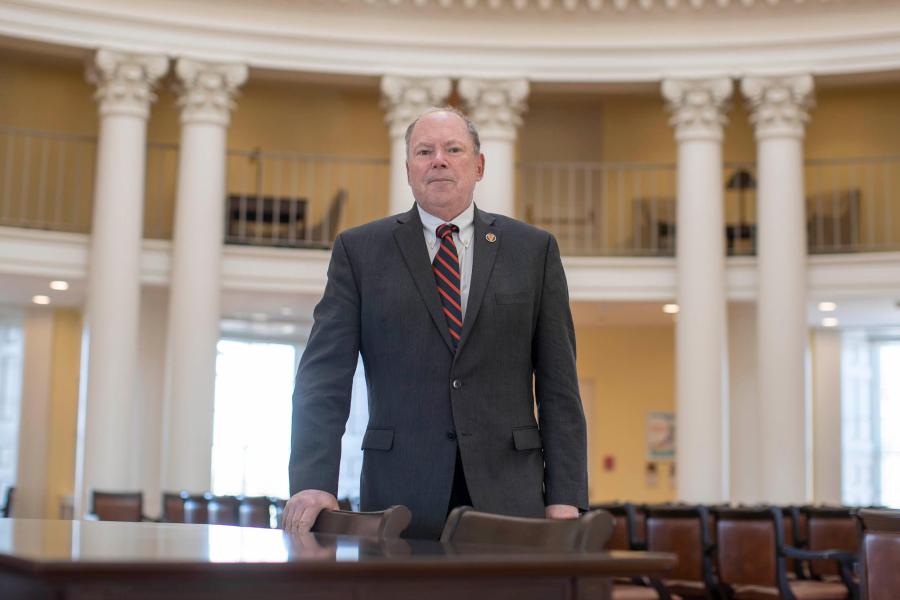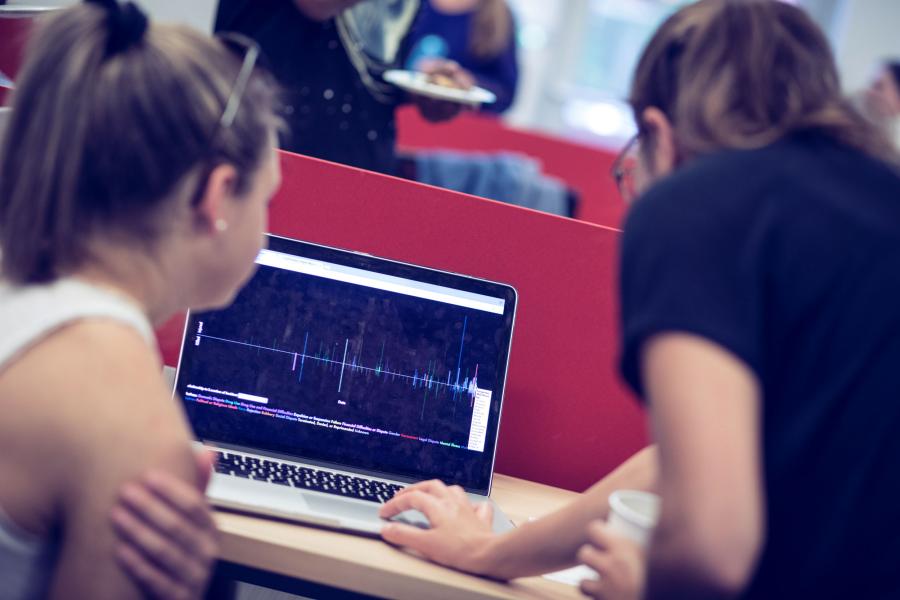Bringing Data Analytics to the NBA
What can data science tell you about basketball? Quite a lot, according to 2017 graduate Sam Garofalo.
Garofalo is a data scientist in the National Basketball Association’s basketball strategy and analytics group. From the league’s New York City office, she and her team study, among other things, how rule changes could change the game and how scheduling affects performance.
For example, last season the NBA changed the shot clock rules so that, after an offensive rebound, teams had only 14 seconds to get off another shot, rather than the previous 24 seconds.
“Our group helped to make that decision, because the data projected it would improve the flow of the game,” said Garofalo, who graduated from the UVA Data Science Institute’s master’s program, a precursor to the School of Data Science. “That proved true during the season, as we saw a higher pace of play.”
In fact, pace of play jumped by 2.7 possessions per game in 2018-19, a big leap when compared to past increases.
“Basketball was always an interest of mine, but I didn't think I could make a career out of it.”
Sam Garofalo
That’s just one example of how the numbers that NBA data scientists crunch translate on the court. For Garofalo, it’s a dream job made possible by her time at UVA. She played basketball through high school and has always been a fan of the sport. When UVA data science students were offered an opportunity to attend a hackathon hosted by the NBA, she jumped on it. Now, she is part of the team that puts on the hackathon for current students.
“That’s how they got my résumé,” she said. “Basketball was always an interest of mine, but I didn’t think I could make a career out of it.”
Fighting Fraud at Capital One
In the battle against fraud, 2016 M.S. in Data Science graduate Brian Sachtjen is one of the good guys. He’s a data scientist on Capital One’s fraud protection team, working out of the Richmond office.
His team builds computer models that predict fraud and check for identity-theft risks at every step of the banking process, from opening accounts to deposits and withdrawals. If the algorithm shows a high enough risk, Sachtjen and his team place an alert on the account and start a more comprehensive review.
“There is a lot to lose, and it’s so important to have careful defenses in place at every stage,” he said.
The biggest challenge is keeping up with the changing nature of fraud
“If we are sloppy with the data, it could undermine how each defense performs.”
Brian Sachtjen
“It’s kind of like a game of whack-a-mole,” he said. “People commit fraud in one area, and as soon as we close that door, they change their behavior entirely.”
With millions of transactions per year coming through his team, it’s impossible to monitor everything manually.
“Big data and computer modeling is absolutely necessary, but we have to be smart about it,” he said. “If we are sloppy with the data, it could undermine how each defense performs.”
Measuring the Twitter-sphere
2014 graduate Cephra Stuart is a data scientist at Twitter, based at the social media giant’s headquarters in San Francisco.
As a member of Twitter’s metrics team, she monitors how audience metrics change over time. How much has the number of active users grown month-to-month? Why have users, or tweets, spiked at a particular time?
“We saw significant spike with the news about Kobe Bryant’s death,” Stuart said, speaking days after the tragic helicopter crash that killed nine people. “Part of my job is knowing what is behind those numbers.”
Stuart, who joined the company in the fall, said the autonomy and creativity the company encourages in its data scientists has been helpful when tackling such a huge amount of data.
“When we get a problem, the way we approach the analysis is up to us,” she said. “It’s pretty cool to have that kind of autonomy and get to be creative.”
“When we get a problem, the way we approach the analysis is up to us.”
Cephra Stuart
One problem she is focused on right now is measuring one Twitter user’s influence on other users.
“My background is in social psychology, so I like to approach it from that angle,” said Stuart, who graduated from the Frank Batten School of Public Policy. “I studied the theory of persuasion, what exactly makes someone persuasive, and I can apply that here.”
Stuart said she was excited to hear about UVA’s new School of Data Science. The Data Science Institute was established in 2013, right before she graduated. Looking at the job market now, she said, she could see why UVA is growing its data science offerings.
“When I was applying for jobs, I noticed that most companies were looking for people with a strong background in statistics, who could use all of these data science tools,” she said. “I think it is very important, and very relevant to almost any job.”
She is also eager to promote diversity and inclusion in her field, where women, especially African American women, are underrepresented.
“My passion is people, and diversity and inclusion has been a big focus in my career,” she said. “I’ve spent a lot of time coaching leaders and companies about creating more diverse teams and an inclusive culture, and I am excited to do that work at Twitter, and build a community where everyone can thrive and grow.”
Leading Machine Learning at Morgan Stanley
Another 2016 M.S. in Data Science graduate, Nicholas Venuti, is now a vice president of machine learning at Morgan Stanley in New York City. Venuti, who earned an undergraduate degree in chemical engineering from North Carolina State University, started working with data analytics in his first job at an environmental consulting firm and came to UVA to build those skills.
“I liked the mixture of theory and application the program offered,” he said. “You need both to be a solid data science practitioner … and UVA itself is also a top-tier school in statistics and computer science, the bread and butter of data science.”
At Morgan Stanley, Venuti and his team work with other teams across the bank, from finance to marketing and more, to create computer programs that help those teams do their best work. For example, Venuti’s team recently worked on an artificial intelligence program that helps Morgan Stanley’s traders choose which bonds to buy.
“Everyone realizes how much potential there is, in terms of creating better products.”
Nicholas Venuti
They built an algorithm that scans through bond reports from different agencies, filters text into positive and negative categories and identifies the topics discussed within each report.
“Traders can quickly review reports from different rating agencies for the same bond and ascertain what was discussed by each agency, where there was overlap and the sentiment of each report,” Venuti said.
Across the financial sector, Venuti called the growth of artificial intelligence an arms race of sorts.
“Everyone realizes how much potential there is, in terms of creating better products for customers, and wants to be the first to get there,” he said.




